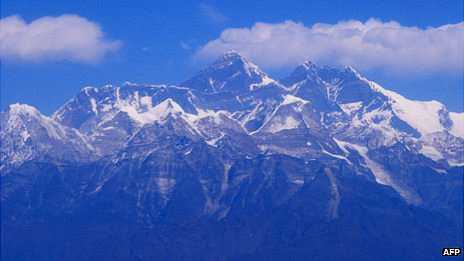By Jonathan Head BBC News, Istanbul

View of Everest – file pic
It isn’t often these days that you see two men, arms round each other, holding Israeli and Turkish flags.
But an extraordinary rescue on the world’s highest mountain has bonded two climbers, one from Israel and one a Turk.
By his own account Nadav Ben-Yehuda was only 300 metres from the summit of Mount Everest, and on course to become the youngest Israeli to conquer it, when he spotted someone lying in the snow, clearly in trouble.
He recognised Aydin Irmak as a Turkish climber he had befriended down at base camp. Other climbers, set on reaching the summit, or just too exhausted by the altitude, had passed by without helping.
Irmak had no gloves, no oxygen and no shelter, according to Ben-Yehuda, and was unconscious.
Climbers Nadav Ben-Yehuda (left) and Aydin Irmak after descent (pic: Israeli embassy, Kathmandu) Ben-Yehuda (left) saved a life – and had to abandon his summit bid
So the Israeli abandoned the goal he had been preparing for over many months, and helped to carry Irmak down the tough, nine-hour descent to base camp, from where both men were evacuated by helicopter for medical treatment. Both are suffering from frostbite. Irmak would certainly have died without help.
The story has inevitably been widely covered in the Israeli media, but it is also being reported in some Turkish newspapers – a rare piece of positive news about a country many Turks only ever see in the most negative light.
Pro-Palestinian mood
Turkish-Israeli inter-state relations have been deteriorating for many years, driven by a Turkish government which feels outrage over Israeli policy towards the Palestinians, and an Israeli government which has refused to soften that policy to accommodate the sensibilities of the only ally it had in the region.
Relations hit an all-time low in May 2010, when Israeli commandos stormed a ship full of activists trying to break the blockade of Gaza, killing nine Turkish citizens.
Attitudes in Turkish society have also hardened towards Israel. Rising Islamic piety in much of the country has led to a stronger sense of solidarity with perceived Islamic grievances elsewhere, the Palestinian issue foremost until the dramatic Arab uprisings of the past year. That hostility has also been fuelled by Turkish television dramas, which often portray Israel as a brutal military oppressor.
Nadav Ben-Yehuda (pic: Israeli embassy, Kathmandu) Ben-Yehuda got frostbite in his fingers because he had to take his gloves off
The story of Nadav Ben-Yehuda and Aydin Irmak contradicts that narrative.
So could it help break the ice between Turkey and Israel?
There have been other “ice-breaking” episodes: the time Turkey sent water-bombing aircraft to help Israel combat deadly forest fires in December 2010, and the aid Israel sent to Turkey after the earthquake that struck Van last year. But neither prompted a breakthrough in restoring relations.
Turkey is still adamant that there can be no real improvement until Israel apologises and pays compensation for the nine people killed on board the Gaza flotilla. A Turkish prosecutor has asked a court in Istanbul to accept an indictment of murder against senior Israeli military commanders over the incident.
The two countries are at odds over other issues, in particular Israel’s involvement in the exploitation of oil and gas off the coast of Cyprus, a project Turkey opposes because it does not recognise the Cypriot government.
Regional realpolitik
Trade between Israel and Turkey, though, has been largely unaffected – it actually grew last year to well over $3bn (£2bn). Israeli tourist numbers have dropped sharply, but those who come receive the same hospitality given to other visitors in Turkey’s more liberal-minded coastal resorts.
The turmoil in the Arab world, especially Turkey’s strife-torn neighbour Syria, means that Ankara is once again relying more on its alliance with the US, and co-operation with staunch US allies like Qatar and Saudi Arabia.
And the US is telling Turkey to fix the row with Israel, saying it is an unnecessary distraction from the more serious challenges confronting Ankara in the Middle East. It is still is not clear how that thaw can happen.
But the tale of a good deed high in the Himalayas can only help.
via BBC News – Rescue of Everest climber helps Israel-Turkey thaw.